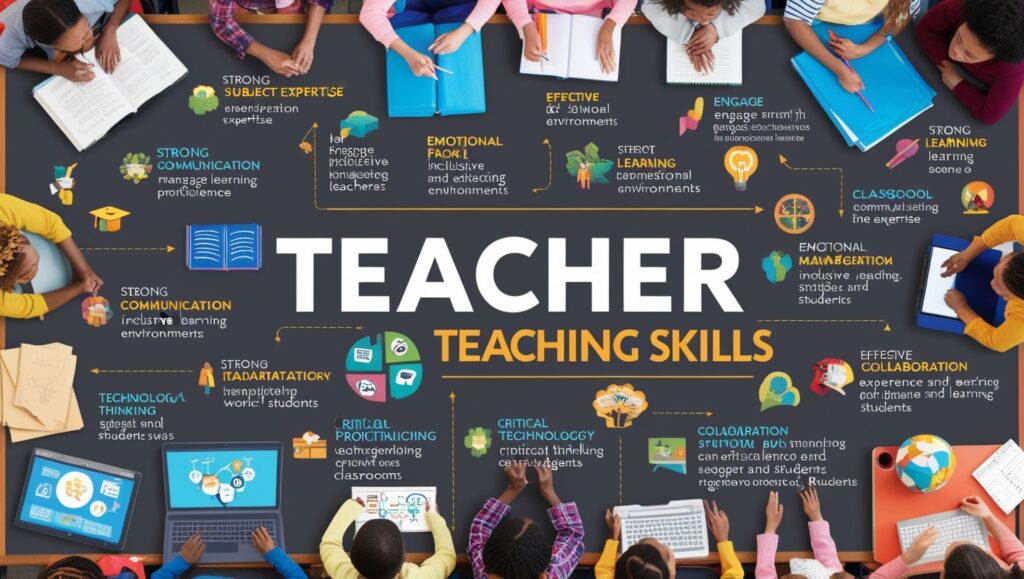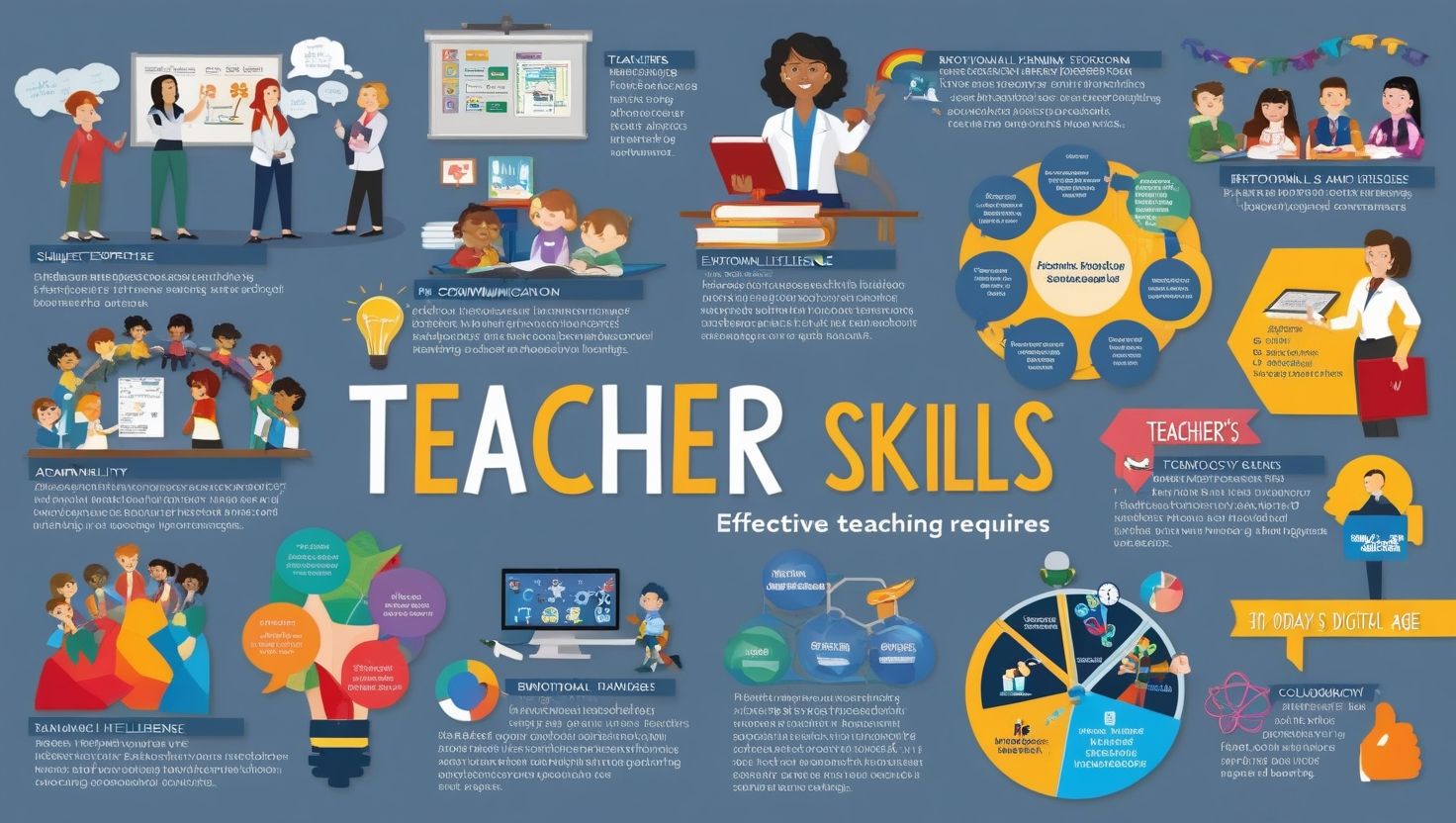Teacher Skills, Teaching is more than just delivering lessons; it is a dynamic profession that requires a diverse set of skills to foster an effective learning environment. As the demands of the education sector evolve, so too must the skills of the educators who shape the minds of future generations. A teacher’s role has expanded far beyond the traditional confines of a classroom lecturer. Today, teachers are expected to be facilitators of learning, motivators, problem-solvers, and empathetic leaders. To meet these expectations, they must possess a wide array of skills that range from instructional expertise to emotional intelligence and technological proficiency.
This article will explore key teacher skills that are essential for success in modern classrooms, and how these skills contribute to creating a positive and inclusive learning environment.
1. Subject Matter Expertise
At the core of teaching is the ability to impart knowledge, and this starts with a deep understanding of the subject matter. Subject matter expertise ensures that teachers can accurately and confidently teach their content, answer student questions, and make connections between theoretical concepts and real-world applications. Teachers who are experts in their field can simplify complex topics, engage students in meaningful discussions, and foster a passion for learning.
However, subject matter knowledge alone is insufficient. Effective teachers not only know the content but also understand how to teach it in a way that resonates with diverse learners. They continuously update their knowledge to stay current with the latest developments and research in their discipline, ensuring their teaching remains relevant and informed by best practices.
2. Pedagogical Skills
While subject matter expertise is important, knowing how to teach is equally critical. Pedagogy, the art and science of teaching, requires an understanding of how students learn and the ability to employ various instructional strategies to meet the needs of different learners. Pedagogical skills include lesson planning, curriculum development, and classroom management.
A skilled teacher knows how to design lessons that align with learning objectives, use assessment tools to gauge student understanding, and differentiate instruction to cater to a range of abilities. For example, a teacher might use collaborative group work, hands-on activities, or flipped classrooms to engage students actively in the learning process. Teachers must also be adept at assessing student performance and using feedback to adapt their teaching methods accordingly.
3. Communication Skills
Effective communication is a foundational skill for any teacher. It goes beyond merely speaking clearly or delivering information. Teachers must be able to articulate complex ideas in a way that is accessible and engaging to students. This includes the use of verbal and non-verbal communication, such as tone of voice, body language, and eye contact, to create a positive and inclusive classroom atmosphere.
Additionally, communication skills are crucial in fostering relationships with students, parents, and colleagues. Teachers must regularly communicate with parents about student progress, behavior, and any areas of concern. They also collaborate with other educators and administrators to align on curriculum goals and share best practices. Strong communication skills enable teachers to build trust and respect, which is essential for fostering a productive learning environment.
4. Emotional Intelligence
Teaching is an emotionally demanding profession, and teachers must possess high levels of emotional intelligence (EI) to navigate the complexities of student behavior, classroom dynamics, and their own well-being. Emotional intelligence refers to the ability to recognize, understand, and manage one’s emotions while also empathizing with others.
In the classroom, emotional intelligence allows teachers to create a safe and supportive environment where students feel valued and understood. Teachers with strong EI can identify when students are struggling emotionally or academically and offer appropriate support. They are also skilled at de-escalating conflicts, managing stress, and maintaining a calm demeanor during challenging situations. By modeling emotional regulation and empathy, teachers help students develop their own emotional and social skills.
5. Adaptability and Flexibility
The ability to adapt to changing circumstances is essential in today’s rapidly evolving educational landscape. Teachers face a myriad of challenges, from technological advancements to shifting curricula and diverse student needs. Being adaptable means that teachers are willing and able to modify their teaching strategies, lesson plans, and classroom management techniques to meet the needs of their students.
For instance, during the COVID-19 pandemic, many teachers had to quickly adapt to remote or hybrid teaching models, learning how to use digital tools and platforms to engage students online. Teachers who are flexible can think on their feet, troubleshoot problems as they arise, and pivot when necessary to ensure that learning continues, even in less-than-ideal conditions.
Adaptability also extends to being responsive to individual student needs. Not all students learn at the same pace or in the same way, and teachers must be able to adjust their methods to support each learner’s unique path.
6. Technological Proficiency
In today’s digital age, technological proficiency has become a critical skill for teachers. Technology is reshaping education, and teachers need to be comfortable using digital tools to enhance learning. This includes everything from basic computer literacy to advanced knowledge of educational software, learning management systems (LMS), and interactive learning platforms.
Tech-savvy teachers can create engaging multimedia presentations, integrate online resources into their lessons, and use data analytics to track student progress. They can also utilize educational apps and games to make learning more interactive and fun for students. Furthermore, teachers must be skilled in teaching digital literacy to their students, preparing them for a world where technology plays a central role in almost every aspect of life.
However, technological proficiency is not just about knowing how to use tools; it also involves critical thinking about how to effectively integrate technology into teaching. Teachers must ensure that technology serves as a tool to enhance, rather than replace, meaningful learning experiences.

7. Classroom Management
Effective classroom management is key to creating an environment conducive to learning. Teachers with strong classroom management skills can maintain order, minimize disruptions, and ensure that all students are engaged and focused on their tasks. This requires the ability to establish clear expectations, enforce rules consistently, and use positive reinforcement to encourage good behavior.
Good classroom management also involves creating a structured and organized learning environment. Teachers must be able to design routines and procedures that keep the classroom running smoothly, from transitioning between activities to managing group work. Teachers who excel in this area know how to balance structure with flexibility, ensuring that students feel both supported and empowered to take responsibility for their own learning.
Classroom management is not just about maintaining discipline; it’s about creating a positive and inclusive space where students feel respected and motivated to learn.
8. Collaboration and Teamwork
Teaching is often seen as a solitary profession, with teachers working independently in their classrooms. However, collaboration and teamwork are becoming increasingly important skills in education. Teachers must work with colleagues, administrators, parents, and external stakeholders to ensure that students receive the best possible education.
Collaboration among teachers allows for the sharing of resources, ideas, and strategies. It also enables teachers to support one another in addressing challenges and implementing new initiatives. Teamwork is particularly important in co-teaching models or interdisciplinary projects, where teachers from different subject areas work together to create a cohesive learning experience for students.
Collaboration also extends to working with parents and guardians. Building strong relationships with families is essential for supporting student learning and well-being. Teachers who are effective collaborators communicate regularly with parents, involve them in their child’s education, and create a sense of partnership in the learning process.
9. Critical Thinking and Problem-Solving
Teachers constantly face situations that require quick thinking and creative problem-solving. Whether it’s managing classroom conflicts, finding ways to engage a disinterested student, or adapting lesson plans to accommodate different learning styles, teachers must be skilled problem-solvers.
Critical thinking allows teachers to evaluate situations from multiple perspectives, make informed decisions, and implement solutions that benefit their students. This skill is also crucial when it comes to curriculum development and assessment design. Teachers must be able to critically assess the effectiveness of their teaching methods and make data-driven decisions to improve student outcomes.
In addition to solving problems in the classroom, teachers must also help their students develop critical thinking skills. By encouraging students to ask questions, analyze information, and think independently, teachers prepare them for success both in school and beyond.
10. Cultural Competence
In today’s increasingly diverse classrooms, cultural competence is an essential skill for teachers. Cultural competence refers to the ability to understand, respect, and effectively interact with people from diverse cultural backgrounds. Teachers who are culturally competent recognize the unique experiences and perspectives that each student brings to the classroom and use this knowledge to create an inclusive and supportive learning environment.
Culturally competent teachers avoid biases and stereotypes, ensuring that all students feel valued and respected. They are also adept at designing lessons that reflect the diversity of their students’ backgrounds and experiences. This skill is particularly important in fostering equity in education, as it helps to break down barriers and promote understanding across differences.
Conclusion
The role of a teacher is multifaceted and ever-evolving, requiring a broad range of skills to meet the demands of modern education. From subject matter expertise and pedagogical skills to emotional intelligence and technological proficiency, teachers must be equipped with the tools to foster a positive and inclusive learning environment.
Ultimately, the skills that make a great teacher are not just about knowledge or technical proficiency—they are about connection, empathy, and the ability to inspire students to reach their full potential. As the education landscape continues to change, teachers who are adaptable, collaborative, and culturally competent will be well-positioned to lead the next generation of learners to success.
References:
- Hattie, J. (2009). Visible Learning: A Synthesis of Over 800 Meta-Analyses Relating to Achievement.
- Darling-Hammond, L. (2000). Teacher Quality and Student Achievement: A Review of State Policy Evidence.
- Fullan, M. (2007). The New Meaning of Educational Change.
- Shulman, L. S. (1986). Those Who Understand: Knowledge Growth in Teaching.

6 thoughts on “Teacher Skills”
Comments are closed.